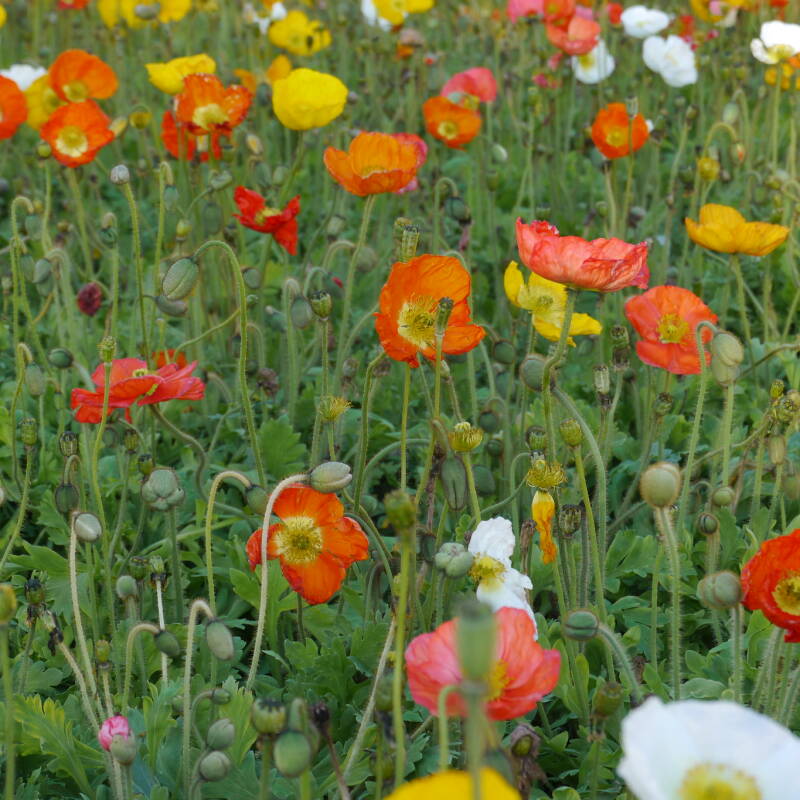Athough impressively neat, the cutting garden at Easton Walled Gardens in Lincolnshire is not precious. Secateurs are provided for visitors who would like to help themselves to sweet peas and alchemilla mollis. Lucy, the flower arranger for Easton, also helps herself.
The Pickery is the name this garden goes by. The name implies industry and productivity yet the garden–located a three and a half hours’ drive north of London–does look like a garden, despite the constant whittling away. The secret is in the planning: after the tulips come the annuals and any bare batches will not be bare for long. The Pickery is part of 12 acres surrounding a demolished Elizabethan house. The garden was brought back from the brink with the vision of Ursula Cholmeley, whose family owns the estate. Beyond the tidiness of the cutting garden, there are ambitious meadows along terraces; a fascinating walled garden across the extravagant bridge, and roses growing in very relaxed fashion through long grass. But that’s another story.
Photographs by Kendra Wilson for Gardenista, except where noted.
Above: Roses around the door. In this instance Tess of the D’Urbevilles ($23.95 from David Austin, or £14.50). A really productive cutting garden makes good use of vertical space as well as the ordered grid of flower beds. For more vertical garden DIY inspiration, see “The Original Vertical Garden: Hotel Raphael in Rome.”

Above: This plot is super-modular, echoed in the grid of the path. Not a place to mess around, especially if you are a plant. Photograph by Fred Cholmeley.
Above: Hardy perennials (Fennel) grow alongside half-hardy annuals (Cosmos); In the States, they’re available for $5.95 and $4.95 apiece, respectively, from Annie’s Annuals. In the UK Sarah Raven supplies cosmos Purity and fennel as seeds, £1.95 per packet. Planting in long lines is both productive and pretty.
Above: Useful in the border, useful to cut, this bronze fennel is about to burst into flower. English pot marigold, or Calendula, and cat mint grow in rows behind, with the Jacobean gate house overlooking the whole.
Above: Calendula Indian Prince ($2.13 for a packet of seeds from Seedaholic) is planted in waves with curly parsley and love-in-a-mist. A selection of nigella as well as c. Indian Prince available from Mr Fothergill’s, £1.55 per packet. Herbs like parsley and apple mint are very useful in flower arrangements, and are much favored at Easton. They have the right kind of leaf and stem structure to keep a bunch of flowers together, and the scent from the herbs, mingled with that of the flowers, will add more depth to a bouquet.
Above: On the subject of scent, there are many varieties of sweet pea in the Pickery. Pictured here: L. Beth Chatto (£3.30 for a packet of 20 seeds from Sweetpeas Online).
Above: A cutting garden relies on “cut and come again” flowers, and sweet peas require regular cutting. They come in very agreeable colors as well…. Lathyrus odoratus Duo Salmon. A packet of seeds is $5.95 from American Meadows.
Above: “The more we pick, the more the plants flower,” says Ursula. “If you don’t pick, everything goes over too quickly, so we settle for lots of picking to maintain the look of the garden.” This is scarlet lathyrus is Henry Thomas. (It’s £2 from the Shop at Easton.) “We do have the odd quiet day or two when we have picked heavily,” she adds.

Above: Modern varieties of scented sweet peas are grown tall and vertical against netting. Very easy to cut, with scent wafting freely. Shown here, lathyrus Comet.

Above: Onward and upward: sweet peas are easy to access when ranged against netting at regular intervals.
Above: Old-fashioned sweet peas, like this classic Matucana ($2.25 for a packet of 25 seeds from Diane’s; in the UK, a wide selection of sweet peas from Nicky’s Nursery are around £1.59 per packet), are usually less vigorous than the modern varieties and are grown at Easton against cylindrical shapes within the beds, which gives a more relaxed feel.
Above: Yet more scent, and subtle color: Rosa Leander, scrambling up a wall. It’s $23.95 from David Austin.

Above: Not a Gertrude Jekyll-style border. It can be slightly disconcerting to see the wavy informality of grasses planted in modules but they have been specifically planted for the attraction of their foliage. And attractive it is, especially when being blown around in the July breeze.

Above: The secret of a productive cutting garden. Very neat edges, flowers planted in lines and blocks. Does Ursula ever worry that she will run out of one type of flower? “As one flower goes over, we try to make sure there is something to take its place. So, as the hardy annuals fade, we rely more on the half-hardies and dahlias.” This bed will not have empty spaces for long.
Above: Plants with good foliage are also key. Alchemilla mollis ($24 for three plants from White Flower Farm) only has borderline-weed status with those who fail to recognize its value as a cut flower. And left in the ground it is a very attractive receptacle for raindrops. (N.B.: For more, see 156 images of English Gardens in our Gallery of rooms and spaces.)































Have a Question or Comment About This Post?
Join the conversation (1)